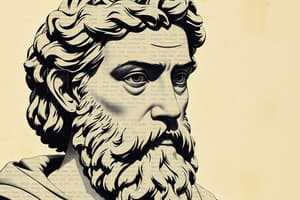Podcast
Questions and Answers
Who was a Greek philosopher known for his method of inquiry?
Who was a Greek philosopher known for his method of inquiry?
- Aristotle
- Socrates (correct)
- Plato
- Saint Augustine
Socrates was known for his good reputation and acceptance in society.
Socrates was known for his good reputation and acceptance in society.
False (B)
What phrase reflects Socrates' belief about self-knowledge?
What phrase reflects Socrates' belief about self-knowledge?
The unexamined life is not worth living
According to Plato, what is the ultimate reality?
According to Plato, what is the ultimate reality?
What are the three parts of the soul according to Plato?
What are the three parts of the soul according to Plato?
Saint Augustine completely rejected Plato's influence.
Saint Augustine completely rejected Plato's influence.
The Socratic Method involves asking a series of questions to determine underlying __________.
The Socratic Method involves asking a series of questions to determine underlying __________.
Flashcards are hidden until you start studying
Study Notes
Understanding Philosophy
- Philosophy stems from Greek words "Philo" (love) and "Sophia" (knowledge/wisdom), symbolizing the pursuit of knowledge for its own sake.
Socrates
- A pivotal Greek philosopher who laid foundations for Western thought.
- Information about him mainly comes from Plato and historian Xenophon.
- Renowned for the Socratic method, which involves inquiry through a series of questions to uncover underlying beliefs.
- Accused of impiety and corrupting the youth, he was sentenced to death by poison hemlock at age 70.
- Key beliefs include the immortality of the soul, virtue's necessity for happiness, and the importance of self-examination.
- Famous quotes: “I know that I don't know” and “The unexamined life is not worth living.”
- Advocated that one must analyze their nature and values to improve life; inner being determines life quality.
- Distinguished between visible (changing) and invisible (constant) existence, with the soul as the ruler of the body.
Plato
- A student of Socrates who significantly shaped the Western understanding of self.
- Authored the Socratic Dialogue, featuring Socrates as a central character.
- Developed the Theory of Forms, asserting that ultimate reality exists beyond the physical world.
- Described the soul as the most divine aspect of humanity, essential for grasping Forms (ideas).
- Identified three parts of the soul:
- Appetitive: Focused on sensual pleasures, such as food and drink.
- Rational: Prioritizes truth and reason, ruling over appetitive desires.
- Spirited: Balances passion and reason, motivated by honor and victory.
St. Augustine
- Saint Augustine of Hippo contributed to Christian philosophy and theology.
- Recognized as one of the Latin Fathers and Doctors of the Church.
- Deeply influenced by Plato's ideas regarding the immaterial nature of the self.
- Asserted that all knowledge ultimately leads to God.
- Believed the soul encompasses truth and possesses the capability for rational thought.
Studying That Suits You
Use AI to generate personalized quizzes and flashcards to suit your learning preferences.




